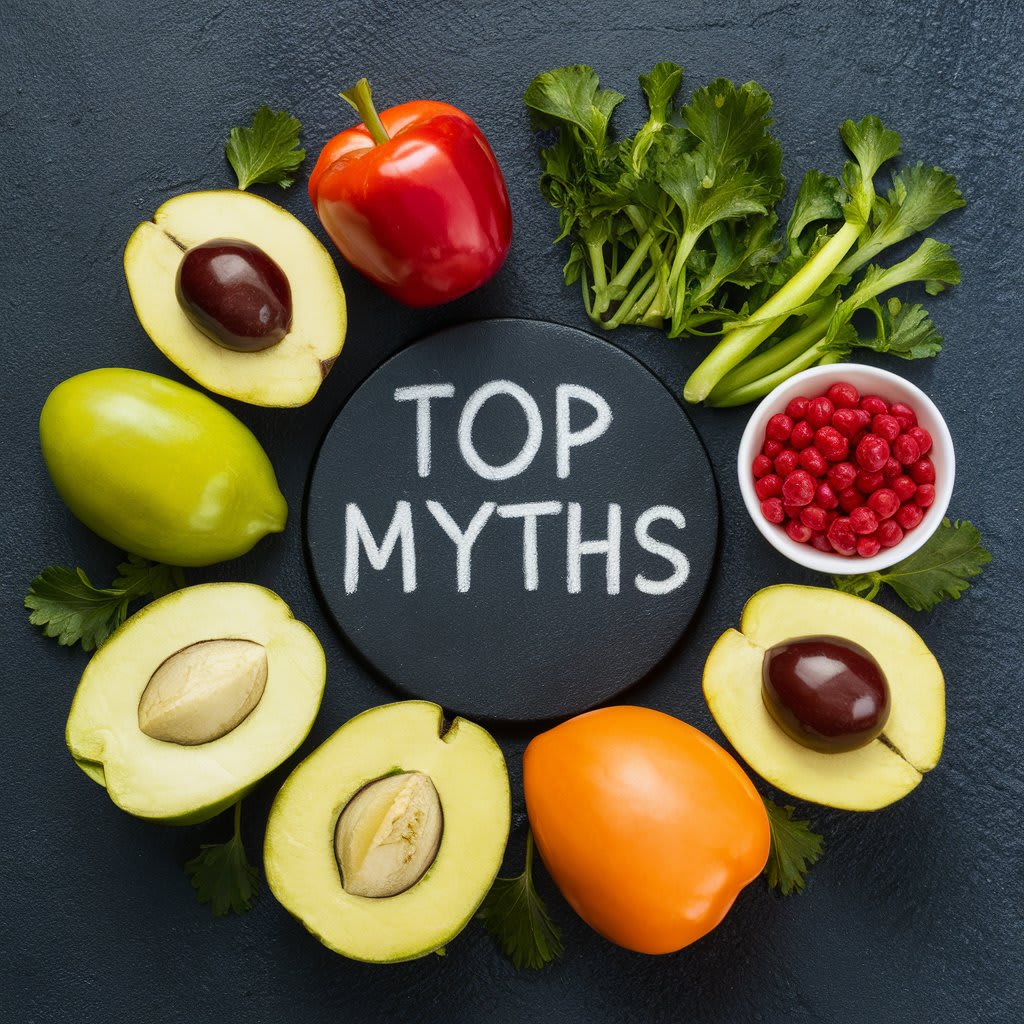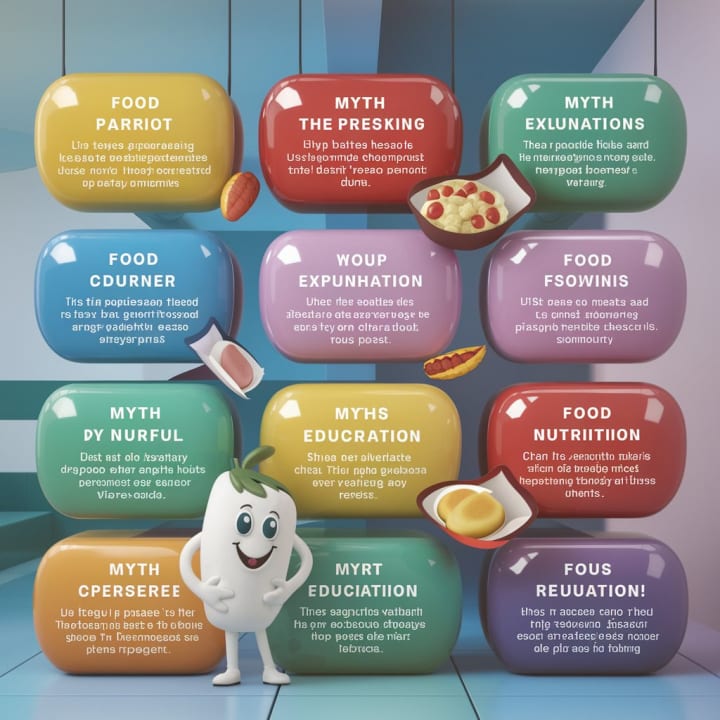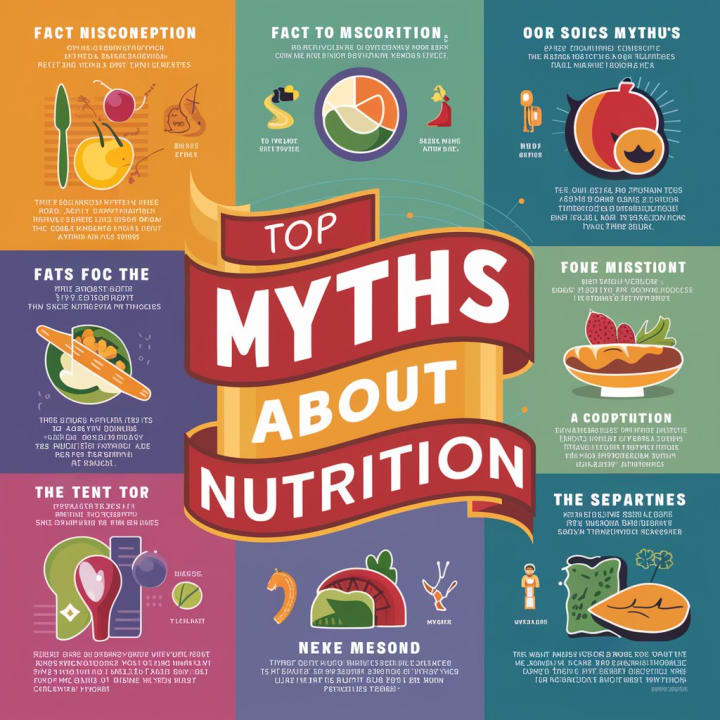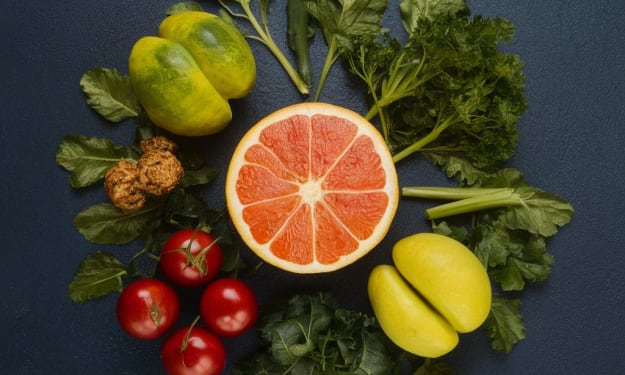Top 10 Nutrition Myths You Need to Unlearn
Debunking the Dinner Plate:

In the ever-evolving world of nutrition, navigating conflicting information and fad diets can feel like a minefield. Separating fact from fiction is crucial for establishing healthy and sustainable eating habits. This guide debunks the top 10 nutrition myths, empowering you to make informed choices about the food you nourish your body with.
Myth #1: Carbs are the Enemy
(carbs, healthy carbs, complex carbohydrates, refined carbohydrates)
Carbohydrates have been demonized by some diet trends, but they are an essential source of energy for your body and brain. The key lies in choosing the right types of carbs. Complex carbohydrates, found in whole grains, fruits, and vegetables, provide sustained energy and valuable fiber.
Conversely, refined carbohydrates like white bread, pastries, and sugary drinks offer a quick energy spike followed by a crash, leading to cravings and overeating. Focus on incorporating complex carbohydrates into your diet for long-lasting energy and optimal health.
Myth #2: All Fat is Bad
(healthy fats, dietary fats, unsaturated fats, saturated fats)
Similar to carbs, not all fats are created equal. Healthy fats, such as unsaturated fats found in avocados, nuts, and olive oil, play a vital role in hormone regulation, cell health, and nutrient absorption.
In contrast, saturated and trans fats, commonly found in processed foods and fried dishes, can contribute to heart disease and other chronic conditions. Aim to limit unhealthy fats and prioritize incorporating healthy fats into your diet for a balanced and nutritious approach.
Myth #3: Restricting Calories is the Only Way to Lose Weight
(calorie intake, weight loss, metabolism, healthy weight management)
While calorie intake plays a role in weight management, it's not the sole factor. Restrictive calorie diets can lead to muscle loss, a sluggish metabolism, and increased cravings in the long run.
Focus on a balanced diet rich in whole foods, including protein, healthy fats, and fiber. This approach promotes satiety, encourages sustainable weight management, and fuels your body with the nutrients it needs to thrive.
Myth #4: You Need Meat to Get Enough Protein
(protein sources, plant-based protein, complete protein, incomplete protein)
Protein is essential for building and repairing tissues, but meat isn't the only source. Plant-based protein sources like beans, lentils, tofu, tempeh, nuts, and seeds can provide all the essential amino acids your body needs, especially when combined thoughtfully throughout the day. Contrary to popular belief, these sources are considered "complete protein" when combined in various forms within your diet.
Myth #5: Detox Diets Cleanse Your Body of Toxins
(detox diets, body detoxification, healthy liver function)
Your body has a natural detoxification system – your liver and kidneys! Fad detox diets often involve restrictive eating, which can deprive your body of essential nutrients and disrupt healthy gut bacteria.
Instead of relying on quick fixes, focus on nourishing your body with whole foods, staying hydrated, and prioritizing healthy sleep habits. These strategies support your body's natural detoxification processes for optimal health.

Myth #6: Fresh Produce is Always Healthier Than Frozen or Canned
(frozen vegetables, canned fruits, fresh produce, nutrient content)
Fresh produce is ideal, but frozen and canned options offer convenient and affordable alternatives. The freezing process can lock in essential nutrients, while canning methods often involve adding preservatives.
Both frozen and canned options can be a valuable addition to your diet, especially when fresh produce is out of season or limited in availability. Look for options with minimal added sugar or sodium when selecting canned goods.
Myth #7: All Sugar is Bad
(natural sugars, added sugars, healthy diet, mindful eating)
There's a difference between natural sugars found in fruits and added sugars. Natural sugars are part of a healthy diet, providing your body with readily available energy.
However, added sugars, found in sugary drinks, processed foods, and desserts, contribute to weight gain, increased risk of chronic diseases, and disrupted blood sugar levels. Be mindful of added sugars and focus on whole foods for your daily dose of sweetness.
Myth #8: Skipping Meals Speeds Up Weight Loss
(skipping meals, metabolism, healthy eating habits)
Skipping meals can actually hinder your weight loss efforts. When you deprive your body of food, it goes into starvation mode, slowing down your metabolism and promoting unhealthy food cravings later. Aim for regular, balanced meals and healthy snacks throughout the day to keep your metabolism running efficiently and prevent overeating later.
Myth #9: Gluten-Free Diets Are Healthier for Everyone
(gluten, celiac disease, gluten sensitivity, healthy dietary choices)
Gluten-free diets are only necessary for individuals with celiac disease or gluten sensitivity. Gluten is a protein found in wheat, barley, and rye. For those without gluten intolerance, following a gluten-free diet doesn't offer any inherent health benefits.
In fact, some gluten-free products may be higher in calories, sugar, and unhealthy fats compared to their gluten-containing counterparts. Focus on a balanced diet that incorporates whole grains and make adjustments only if you have a diagnosed gluten intolerance.
Myth #10: Certain "Magic" Foods Burn Fat
(spot reduction, weight loss strategies, healthy eating patterns)
Unfortunately, there's no magic bullet for weight loss. Specific foods don't directly target fat burning in isolated areas. Sustainable weight management involves a holistic approach, including a balanced diet, regular physical activity, and sufficient sleep.
While certain foods may have properties that can support metabolism or satiety, they won't magically melt fat away. Focus on a healthy eating pattern and consistent lifestyle changes for lasting results.

Embrace a Balanced and Informed Approach to Nutrition
By debunking these common myths, you can embark on a journey of mindful eating and embrace a sustainable approach to nutrition. Remember, healthy eating is not about deprivation or fad diets. It's about nourishing your body with a variety of whole foods, prioritizing balance, and listening to your body's cues.
With the right knowledge and a focus on long-term well-being, you can cultivate a healthy relationship with food and fuel your body for a vibrant life.
Hashtags: #nutritionmyths, #healthy eating, #weightloss, #balanceddiet, #protein, #healthyfats, #carbs, #detox, #sugars, #glutenfree, #fatburning, #healthylifestyle
About the Creator
Sherif Saad
Hey there, fellow word enthusiasts! I'm Sherif, and I'm thrilled to embark on this creative journey with you
I'm a passionate writer with a love for storytelling that knows no bounds diving into the world of words.
Enjoyed the story? Support the Creator.
Subscribe for free to receive all their stories in your feed. You could also pledge your support or give them a one-off tip, letting them know you appreciate their work.






Comments
There are no comments for this story
Be the first to respond and start the conversation.